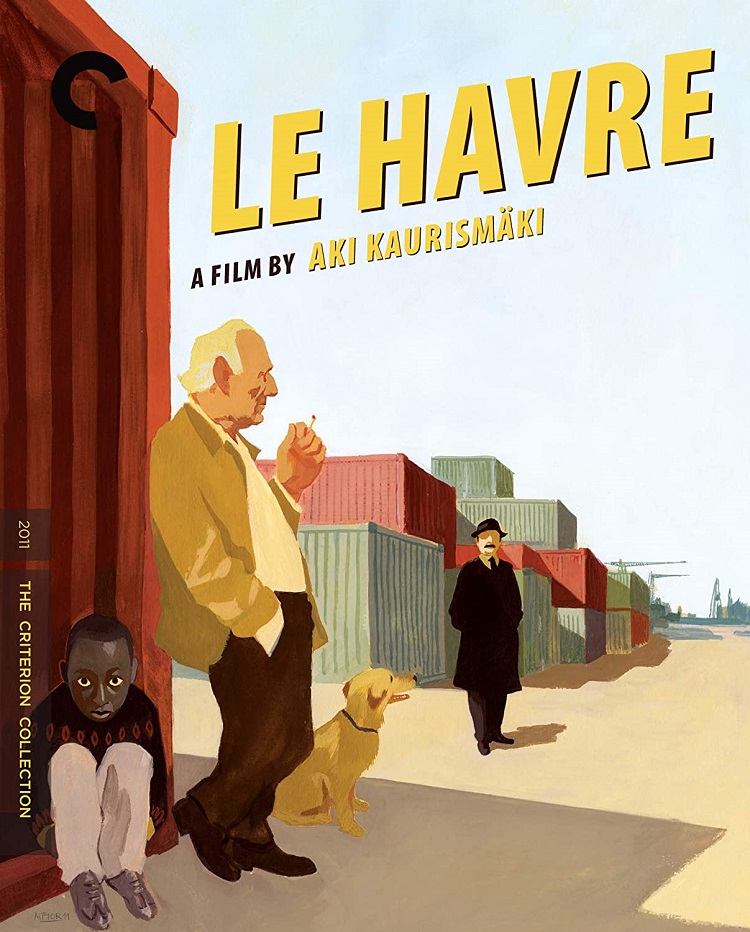
The setup for this film is straightforward: a poor aging French shoe-shiner helps a young African illegal immigrant evade capture by the police. However, what sounds like the basis for a political statement about immigration or a tear-jerker friendship between the unlikely pair is instead transformed into a surreal fable about the innate goodness of man as imagined by maverick Finnish writer/director Aki Kaurismaki. Recalling the fairy-tale trappings of fellow French-language films by director Jean-Pierre Jeunet, such as Amelie and The City of Lost Children, Kaurismaki’s latest film is more given to flights of fancy and scenes of visual wonder than hard drama.
The shoe-shiner is played to perfection by veteran actor Andre Wilms, conveying so much through his wise gaze that he barely needs to communicate verbally. His character, Marcel, is retired but so poor that he’s forced to scrape by as a street shoe-shiner, bringing in spare change to support him and his terminally ill wife (Kati Outinen). He doesn’t know she’s terminally ill, as she fiercely attempts to keep this information from him, but her lengthening stay in the hospital raises his suspicions as the movie progresses. When the local police find a shipping container full of African refugees, one of the kids makes a break for it and ends up entering Marcel’s orbit. Marcel is immediately faced with the choice of exposing the kid to the pursuing police or aiding his efforts to evade capture, and easily chooses to help the youth. What follows is an amazingly lighthearted take on the heavy plot that finds Marcel deflecting ongoing inquiries from the pesky chief inspector while concurrently working with his neighbors to hide the kid and assist his efforts to find passage to his intended destination, England.
Kaurismaki seems obsessed with recapturing the essence of how things used to be, with a focus on the strength of a close-knit community that works together for the common goal of aiding and protecting the youth, as well as the inclusion of old-timey gadgets and settings such as rotary telephones, an ancient automobile, and the charmingly run-down titular seaside town. He recounts in the bonus features that he travelled extensively along the coasts of Spain, Portugal and France before finally identifying the setting for his film, further demonstrating his singular vision for the project. The town of Le Havre seems like it has been left behind by time, and in fact Kaurismaki recounts that much of the port area he used during filming was razed to make room for modern construction shortly after the film’s completion.
The film was released theatrically last year, so restoration efforts were minimal but the print presented here is a new high-definition digital transfer that shines on Blu-ray. Kaurismaki utilizes a muted color palette to enforce the worn-down nature of the town, and the combination of setting, color and lighting often make the film appear as if it was shot in the ‘60s or ‘70s, giving it a warm, classic feel. The soundtrack is 5.1 DTS-HD master audio on the Blu-ray edition, but there’s little in the way of surround effects in the soundstage.
Bonus features include a lively press conference with Kaurismaki and his cast from the Cannes Film Festival, as well as a similar interview with a French TV entertainment program akin to Entertainment Tonight. Both interviews reveal the sarcastic, prickly nature of Kaurismaki, identifying him as an iconoclastic character who doesn’t suffer the fools or their questions. Elsewhere, there’s a lengthy tv interview/career retrospective with recurring Kaurismaki actress Kati Outinen, as well as a brief Criterion-exclusive interview with lead actor Andre Wilms. Finally, there’s some amusing additional concert footage of aging French rocker Little Bob who is featured in the film, offering a couple more songs in his inimitable style.